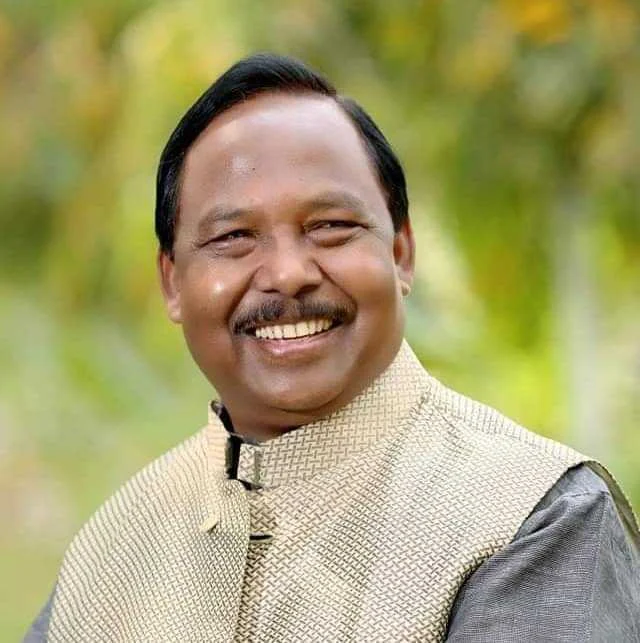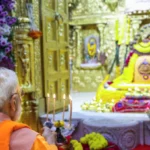By Ramvichar Netam
(Minister for Tribal Welfare, Agriculture and Farmers’ Welfare, Government of Chhattisgarh)
In the chronicles of Indian history, the name Birsa Munda may appear briefly, for his life ended at the young age of 25, yet his presence remains eternal in the consciousness of tribal India. His ideals still breathe through the folk songs, stories, and beliefs of the Adivasi heartlands.
Revered as Dharti Aaba — “Father of the Earth”, Birsa Munda is remembered not only as a revolutionary but as a spiritual and cultural symbol who gave voice to India’s indigenous conscience.
Dharti Aaba signifies not merely the father of the soil but the guardian of earth’s sacred balance — of land, water, forests, and human society all bound by a divine harmony. In tribal tradition, Birsa is worshipped not as a mere leader but as a divine protector, “the light within the darkness,” and a symbol of purity and resistance. His image lives stronger in faith than in history, for his story was written not on paper but in the hearts of those who carried his struggle forward.
Jharkhand, Chhattisgarh, Odisha and Bihar still echo with his name through countless folk tales, songs and rituals.
A popular Munda folk song invokes his memory: “Dharti Aaba Birsa re, Jal-jungle ke rakhwala re, Hulhulaan ke janam lardla, Dedh raj ke tode daal re.”
These songs reflect not mourning, but reverence. They celebrate his defiance and his fight against oppression. Even in grief, his people sing not of his death, but of his undying courage. Folk legends recall that when Birsa moved across the hills, even the winds and birds whispered his name. Such was his aura that the forests themselves seemed to bow before him. After his passing, tribal belief holds that Dharti Aaba merged with the very earth he sought to protect, symbolizing that nature and humanity are eternally one.
By the late 19th century, British exploitation of land and forests, and the growing dominance of dikus — traders, landlords, and moneylenders-, had destroyed the traditional self-governing tribal system. It was on this soil that Birsa Munda rose, leading a spiritual and political awakening that reshaped the consciousness of his people.
Between 1895 and 1897, Birsa initiated a movement of religious reform to restore purity and unity in tribal society. He urged his followers to give up liquor, superstitions, and internal divisions, teaching instead discipline, truth, and devotion to the land.
His idea of Abua Raj — or “our rule”, was both a declaration of self-respect and a rejection of foreign domination. His movement soon took on political form. Between 1899 and 1900, the Ulgulan — the Great Tumult -, reached its peak. Villages rose in rebellion; colonial police stations were attacked. The British, alarmed by his growing influence, launched a harsh crackdown. In March 1900, Birsa was captured in the forests near Jamkopai and imprisoned in Ranchi Jail, where he was martyred on June 9, 1900.
Although Birsa’s life was brief, his impact was profound. His call for freedom and self-rule became the precursor to India’s later independence movement. His Ulgulan was not only a fight against political oppression but a moral uprising against injustice, exploitation, and cultural erasure. Birsa Munda’s worldview was deeply ecological. He believed that life, nature, and spirituality were inseparable. His resistance was not against development, but against destruction, not against progress, but against the loss of balance between man and earth.
Even today, when India observes Janjatiya Gaurav Diwas on November 15, it is not merely a remembrance of a tribal hero, but a reaffirmation of his vision of equality and coexistence. His life teaches us that development cannot mean cutting down forests; it must mean growing alongside them. True progress lies in protecting the roots that sustain us.
Birsa Munda’s legacy continues to guide countless tribal movements across the country, from the struggles for ‘Jal, Jungle, Jameen’ in central India to the fight for land and dignity across Jharkhand, Odisha, and Chhattisgarh. His philosophy inspires both governance and grassroots resistance. He showed that culture is the soul of progress — that without respecting one’s heritage, no modernity can endure. His life bridges history and hope, faith and freedom.
In remembering him, we also remember that justice, equality, and harmony are not mere ideals, but duties toward the land that gives us life. His followers still sing in his honour: “Dharti Aaba Birsa, tore naam se ojhiya, Tore looh se janam ladla, hamar aatm-nirmaan sansar”.
Birsa Munda’s life remains an undying inspiration — a reminder that the path to freedom begins with the protection of one’s earth, one’s faith, and one’s people.
. . .










